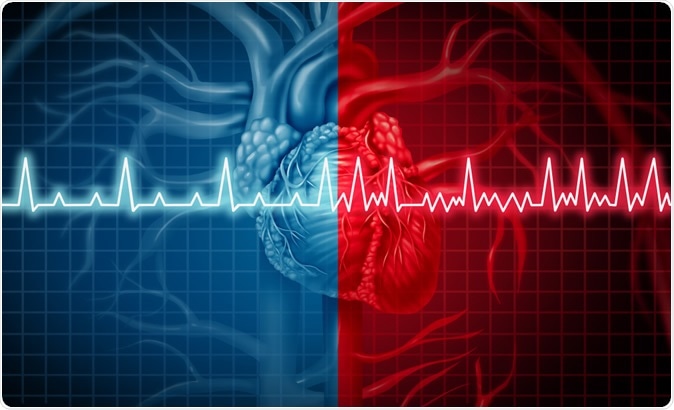This means that AI can help the physician detect asymptomatic AF in the recent past, or warn of AF that is about to happen. This could help treat such patients at the point of care, potentially avoiding a host of devastating complications like clots forming within the heart and then traveling to the brain or the lung. These traveling clots could cause strokes and lung embolism respectively. The outcome can be heart failure and even death.

Image Credit: Lightspring / Shutterstock
In addition, this study improves the utility of EKG which is a very simple, inexpensive and widespread test used to look for heart disease related to many factors.
AF refers to an irregularity in heart rhythm which is due to a problem with the heart’s pacemaker. The pacemaker is a specialized area of heart muscle which is responsible for setting the heart’s normal rhythm. In some disease conditions, it becomes unpredictable, and the heart’s rhythm consequently goes crazy.
The problem with early AF is that it occurs for very short periods of time before spontaneously reverting to normal heart rhythm. This means that a patient who actually had AF may show a normal EKG during the standard 10 seconds of recording from 12 electrodes positioned strategically on the body. To circumvent this, one option is to monitor heart rhythm for a longer period of time, such as by using a loop recorder. This requires a more complicated procedure and pushes up the costs of diagnosis.
However, it is important to diagnose AF accurately and quickly, as the above-mentioned complications can follow untreated AF. Putting these patients on blood thinners can drastically reduce the risk of blood clots within the heart, according to senior author Paul Friedman.
The need to know if AF is present is important in the treatment of a stroke patient, for example. Some types of stroke such as those caused by a traveling clot must be treated with a blood thinner to prevent another stroke. On the other hand, Friedman explains, “For those without AF, using blood thinners increases the risk of bleeding without substantial benefit.”
This means that clinicians urgently need to know if AF is present or is likely to occur before prescribing blood thinners in these situations. They also cannot afford to spend time monitoring the heart for possibly prolonged periods of time to make this diagnosis.
The current study used 450,000 EKGs carried out on Mayo Clinic patients, retrieved from the over 7 million stored in its digital archives, to train AI on the very slight alterations that show the heart structure is different from normal, due to AF. These are such small changes that only AI can possibly scrutinize the EKG with sufficient minuteness and accuracy to pick them up.
The next step was to test the trained AI on over 130,000 EKGs from 36,000 live patients. The tested EKGs all showed normal heart rhythm, but about 3,000 patients had a history of at least one AF episode. Astonishingly and gratifyingly, the AI was able to pick up 90% of AF-positive patients using these ‘normal’ EKGs, using the subtle alterations it had already learnt to recognize as characteristic of AF.
Friedman admits to being surprised by the unexpected accuracy of this very cheap and ubiquitous screening tool. He predicts that if this study is confirmed, AI-guided EKGs could soon help doctors choose the right therapy for diseases related to AF even when the condition is asymptomatic.
Even better, the AI enabling technology is available on smartphones or watches, which means that it can be used by millions of users everywhere.
As Friedman points out, “An EKG will always show the heart's electrical activity at the time of the test, but this is like looking at the ocean now and being able to tell that there were big waves yesterday.” The AI-enabled EKG is unique in being able to obtain very significant data from the heart’s electrical signals which are invisible to the naked eye, yet are very visible to the trained AI.
Commentator Jeroan Hendricks of the University of Adelaide, Australia, says, “Rather than finding the needle in the haystack by prolonged monitoring, authors basically suggest that AI will be able to judge by looking at the haystack if it has a needle hidden in it.” This will cut down the number of patients who need to be tested for AF by prolonged monitoring methods, and immensely increase the benefit to patients with AF who require to be treated for the condition as a top priority.
The study was published in the journal The Lancet on August 1, 2019.
Source:
Journal reference:
Attia Z. I., et al., (2019). An artificial intelligence-enabled ECG algorithm for the identification of patients with atrial fibrillation during sinus rhythm: a retrospective analysis of outcome prediction. The Lancet. https://doi.org/10.1016/S0140-6736(19)31721-0